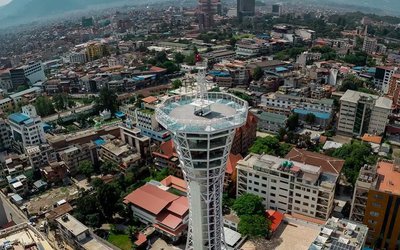As temperatures soar past 40°C across Northern India, schools will soon close for summer break. Families will head to the hills or retreat indoors, seeking refuge in fans and air conditioning. I’ll be heading home to Kathmandu—where the mountain breeze still offers welcome relief.
But what about the streets? And the millions of delivery riders and street vendors? For them, there is no “summer break,” no “work from home,” and certainly no paid leave. Just long, scorching days under the relentless sun, often with no shade, no rest, and no recognition.
As someone about to complete Class 12 and consider my path forward, I find the growing conversations about the digital economy and gig work intriguing. It’s fast, flexible, and powerful. But while we talk about opportunity, we rarely talk about the people powering it—especially those working in unbearable heat, without basic protection.
If the streets are the arteries of our cities, sustained by the labor of gig workers—from New Delhi to Kathmandu—why is so little being done to make those streets more bearable for those who power them? Why don’t we talk about the heat, the exhaustion, or the sheer physical toll of standing or riding for hours on concrete in peak summer?
A 2024 report by Greenpeace India and the National Hawkers Federation reveals that gig workers are among the most affected by rising temperatures. From dwindling customer numbers during peak heat hours to food spoilage and health risks like fatigue and dehydration, the report shows that climate change isn’t just a distant threat—it’s hitting livelihoods now. The heat is eating into their income and endangering their well-being.
Globally, the gig economy is valued at $556.7 billion in 2024 and is projected to grow to $1.8 trillion by 2032. If cities—and their citizens—are to truly benefit from this expanding sector, urban policy must begin treating the streets as critical work environments, deserving of investment, protection, and reform.
We’ve long promoted tree planting and green spaces for sustainability, but it’s time to ask: how can they also serve gig workers? Expanding urban tree cover and creating green corridors, especially along busy delivery routes and marketplaces must become part of our climate and labor strategies.
As I reflect on this, I’ve come to appreciate something I once took for granted: Chautaris—Nepal’s traditional roadside rest stops, usually built under trees with stone or wooden benches. As a child, I saw them as relics of the past. Today, I see them as early examples of climate-resilient infrastructure—designed with care for the sun, the rain, and the weary traveler.
We need to revive this wisdom in modern form. Whether it’s shaded rest points, cooling shelters, or access to clean drinking water, the solutions don’t always need to be high-tech. Sometimes, the difference between a break and a breakdown is just a bit of shade.
The gig economy will continue to grow—and so must our empathy. The convenience of fast deliveries, rides, or street-side snacks shouldn’t come at the cost of someone else’s health.
From cities like New York to Delhi or Kathmandu, the gig economy keeps everything moving—but its workers often remain invisible. We track the parcel, not the person. We enjoy the ride, but ignore the cost paid in sweat and sunburn. It's easy to forget just how harsh the streets can be. And perhaps harder to believe that the solution might be as simple as a tree.
As someone hoping to study law and policy, I want to help push for more inclusive, climate-resilient urban planning. Gig workers are essential to our cities—and our cities must return the favor by becoming livable and safe for them too.
When I return to Kathmandu this summer, I’ll look at Chautaris with new eyes—and with a renewed resolve to do something meaningful for gig workers. Because while schools and offices may close for the summer, the streets do not. And we owe our thanks to those who keep our cities moving, even in this scorching summer.
Deeptangsu Rauniar, a Nepali presently studying in Class XII at Wynberg Allen School, Mussoorie, India, is passionate about law and social equity. She strives to create meaningful impact through advocacy and reform.















